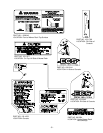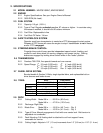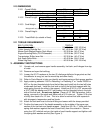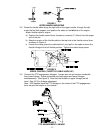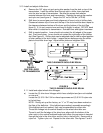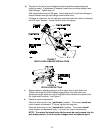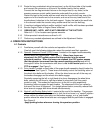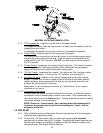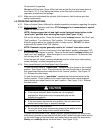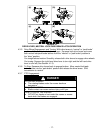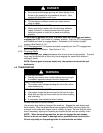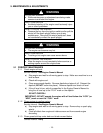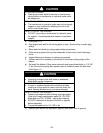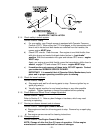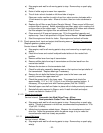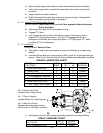
- 16 -
Do not add oil to gasoline.
Do not overfill fuel tank. Never fill the fuel tank so that the fuel level rises above a
level that is 1/2” (1.3 cm) below the bottom of the filler neck to allow for fuel
expansion and prevent fuel spillage.
4.2.3 Make sure you understand the controls, their locations, their functions and their
safety requirements.
4
.
3 OPERATING INSTRUCTIONS
4.3.1 Refer to Engine Owner’s Manual for detailed operating instructions regarding the engine.
4.3.2 Starting Engine
: Operator must have PTO disengaged and transmission in neutral.
Open fuel shut-off valve.
NOTE: Always engage the left and right neutral lock/park brake latches in the
“park brake” position when starting the engine (See Figure 10 (d)).
Pull out the choke control. Place the throttle control midway between the “Slow” and
“Fast” positions. Turn the key to “Run” position. Pull recoil rope to start engine.
After the engine warms up, gradually push in choke control. DO NOT run warm
engine with the choke in the “ON” position.
NOTE: Kawasaki engines generally need to be “choked” even when warm.
4.3.3 Stopping Engine
: Lock the drive levers in the “park brake” position, disengage PTO,
and position transmission in neutral. Place the throttle control midway between the
“slow” and “fast” positions. Allow the engine to run a minimum of 15 seconds; then
turn the key to the “OFF” position.
Close fuel shut-off valve if machine will not be used for a few days, when parking
inside a building, or when transporting the unit.
4.3.4 Drive Lever/Neutral Lock/Park Brake Latch Operation
:
To lock the drive levers in “neutral lock”, squeeze the drive levers to the “neutral”
position. See Figure 10 (b). Place thumbs on the inner thumb lobe of the neutral
lock /park brake latches and rotate them to the “neutral” position. See Figure 10
(c). Release the drive levers.
To lock the drive levers in “park brake”, squeeze the drive levers farther to the
“brake” position. Place thumbs on the inner thumb lobe of the neutral lock/park
brake latches and rotate them to the “park” position. See Figure 10 (d). Release
the drive levers.
CAUTION
POTENTIAL HAZARD
♦ If the neutral lock/park brake latches are not completely
engaged the drive levers could unexpectedly slip into the
forward drive position.
WHAT CAN HAPPEN
♦ If the drive levers slip into the drive position, the unit could lurch
forward and cause injury or property damage.
HOW TO AVOID THE HAZARD
♦ Be sure the drive levers are securely seated at the bottom of the
“neutral” or “park” areas of the neutral lock latches.
To place the drive levers in the “drive” position, slightly squeeze the drive levers
while placing thumbs on the outer thumb lobe of the neutral lock/park brake latches
(or the index finger on the front lobe) and rotate them from under the drive levers.
Slowly and carefully release the drive levers. See Figure 10 (a).



